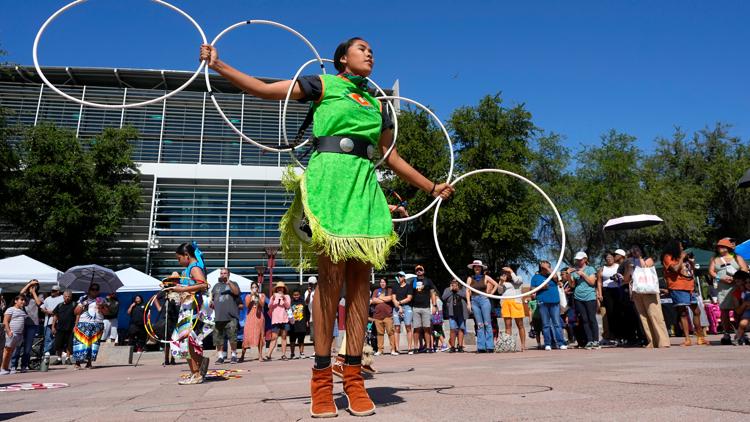This year, Indigenous Peoples Day comes about three weeks before Election Day.


WASHINGTON — As Native Americans across the U.S. come together on Monday for Indigenous Peoples Day to celebrate their history and culture and acknowledge the ongoing challenges they face, many will do so with a focus on the election.
From a voting rally in Minneapolis featuring food, games and raffles to a public talk about the Native vote at Virginia Tech, the holiday, which comes about three weeks before Election Day, will feature a wide array of events geared toward Native voter mobilization and outreach amid a strong recognition of the power of their votes.
In 2020, Native voters proved decisive in the presidential election. Voter turnout on tribal land in Arizona increased dramatically compared with the previous presidential election, helping Joe Biden win a state that hadn’t supported a Democratic candidate in a White House contest since 1996.
Janeen Comenote, executive director of the National Urban Indian Family Coalition, which is involved with at least a dozen of these types of voting events across the country, said this year it’s especially important to mobilize Native voters because the country is selecting the president. But she cautioned that Native people are in no way a monolith in terms of how they vote.
“We’re really all about just getting Native voters out to vote, not telling them how to vote. But sort of understanding that you have a voice and you’re a democracy, a democracy that we helped create,” said Comenote, a citizen of the Quinault Indian Nation.
In Arizona, her coalition is partnering with the Phoenix Indian Center to hold a town hall Monday called “Democracy Is Indigenous: Power Of The Native Vote,” which will feature speakers and performances, along with Indigenous artwork centered on democracy.
In Apex, North Carolina, about 14 miles southwest of Raleigh, the coalition is working with the Triangle Native American Society for an event expected to include a celebration of the 100th anniversary of the Indian Citizenship Act of 1924 and a booth with nonpartisan voter information and giveaways.
While not a federal holiday, Indigenous Peoples Day is observed by 17 states, including Washington, South Dakota and Maine, as well as Washington, D.C., according to the Pew Research Center. It typically takes place on the second Monday in October, which is the same day as the Columbus Day federal holiday.
.png)









 English (US) ·
English (US) ·